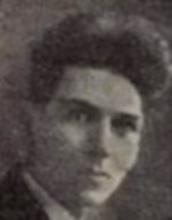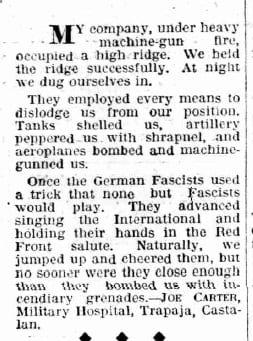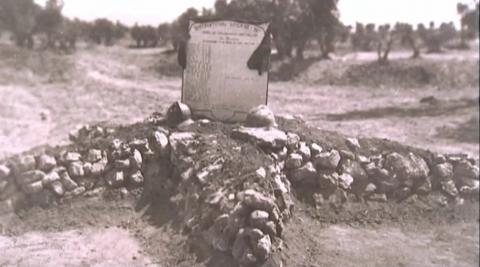International Brigade Memorial Trust
IBMT activist Tony Fox writes about a letter written by Teesside Brigader Thomas James ‘TJ’ Carter to the Daily Worker, a fascist ruse and his death following the Battle of Jarama.

I was recently honoured to be invited to the BBC’s recording of the The Ballad of Johnny Longstaff at the ARC theatre in Stockton on 17 March, not least because once again the Young’uns were performing it in Johnny’s and their home town.
I am most impressed by the fact that there is always something new to take away from listening to the album or watching a performance. This time I noticed there is a reference, in the track ‘Ay Carmela’, to International Brigader Thomas Carter:The first of us fell at Jarama
The earth was warm, our blood was warmer
Thomas Carter came a-stormin’
Ay Carmela! Ay Carmela!
Ne’er to see another morning
Ay Carmela! Ay Carmela!
This reminded me of one of something I found just two days earlier; a letter published in the Daily Worker on 17 March 1937, sent from a volunteer named Joe Carter in the aftermath of the Battle of Jarama.

This short message tells us so much; Thomas Joseph ‘TJ’ Carter was known as Joe in Spain. He is explaining how his company was occupying a high ridge. After fighting during the day they dig in at night and on the next day they are tricked by the fascist enemy forces, which is when Carter was wounded.
The story suggests to me that Thomas Carter was a member of No.2 Company (Machine-Gun) in the British Battalion, he enlisted on 7 January 1937, number 73.
As Carter says he ‘occupied a high ridge’. Looking at the site of the Battle of Jarama, we can discount the Conical Hill occupied by No.1 Company and the description of the ‘trick’ places him in No.2 Company. According to the version that has become part of Jarama folklore, on 13 February some of the machine-gunners in Harry Fry’s No.2 Company were tricked into surrendering by fascist troops who advanced on their unprotected flank singing ‘the Internationale’ and giving the anti-fascist clenched fist salute. Some volunteers have repeated the story found in Frank Ryan’s ‘Book of the XV Brigade’, whilst many historians have subsequently dismissed it as myth. However the story was widespread at the time: it is repeated in a number of contemporary publications and is to this day recalled in most publications on the battle. This letter from Thomas Carter may be the first reference to the story – it is certainly one of the earliest contemporary descriptions.
Secondly we discover that Carter is wounded and in a hospital, I was unfamiliar with its name so I approached my friend and colleague Peter Verburgh, who is much more knowledgeable than I on this matter:
Trapaja is unknown to me – Castalan, however, looks as if it possibly is a garbled reference to Castellón de la Plana – it had two hospitals in 1937, one civilian, the other military, which both had International wounded/patients.
This is possibly the Benicàssim Hospital at Castellón de la Plana, which by coincidence is where John Unthank of Middlesbrough spent six weeks before succumbing to the wounds he received at Jarama, dying on 2 April 1937.
As Thomas Carter’s entry in the IBMT volunteers database lists him as killed in action on 27 February 1937, I had assumed previously that he was killed during the American assault of that day, in which Wilf Jobling was also killed. I wrote in ‘I Sing of My Comrades’:
In an attempt to storm the Nationalist strongpoint at Pingarrón, the 15th Brigade; which now included all 450 Americans of the Abraham Lincoln Battalion under Robert Merriman, led an attack on 27 February. Due to lack of coordination the 15th Brigade advanced without artillery or air support; the predictable outcome was that the Brigade was cut to pieces. Poet Charles Donnelly, part of the Irish contingent who had joined the Lincolns was heard to remark, ‘even the olives are bleeding’, before losing his life. The British had been tasked with supporting the attack by the Lincolns. The result was that No.2 Company Commander Wilf Jobling, along with David Halloran, a Catholic Communist Party member from South Bank in Middlesbrough, and Thomas Carter of West Hartlepool were killed on 27 February 1937 when the attack failed.
It now looks as though he was wounded on 13 February and he succumbs to his wounds and dies on 27 February. That means that the letter was published posthumously.

The date of his death is confirmed on the Jarama memorial (above), erected by members of the British Battalion in 1937. The names ‘Carter T.J.’, ‘Jobling W.’ and ‘Halloran D.’ are all shown on photographs of the memorial, all dated 27-2-37. The memorial was destroyed on Franco’s orders in 1939. Carter, Halloran and Jobling are also listed on the Teesside International Brigades Memorial.
Every October we commemorate the Volunteers for Liberty who gave their lives for the Spanish Republic. The name of Thomas Joseph Carter is read out along with the other Teesside men who fell. With the installation of the new Stockton International Brigades Memorial giving us fresh impetus we will continue to commemorate those who served in the International Brigade.
Posted on 14 April 2022.
